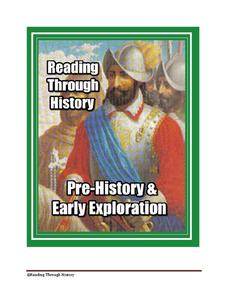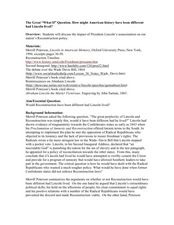Curated OER
Is It Fact or Opinion?
Distinguish between fact and opinions in this nonfiction reading lesson. Middle schoolers read 'The Diary of an Early American Boy' and work in groups to analyze the text. They record the facts and opinions for the text.
Chicago Historical Society
Are We the People?
Taking on the roles of a fiery Boston patriot, a Philadelphia merchant's wife, and a prominent abolitionist, your young historians will consider the reactions of these early Americans to the creation of the Declaration of Independence,...
Reading Through History
Early History and Exploration Unit
We all know about Christopher Columbus, but who else explored the Americas, and specifically, the future United States of America? Learners find out these answers and more in a resource that includes four different reading sections,...
Americans All
A Simulation: The Peopling of America
What was it like to pass through Ellis Island? Learners move through the immigration process of the early 1900s in a simulation activity. A comprehensive activity includes role-playing profiles and other manipulative items such as...
Core Knowledge Foundation
Columbus and the Pilgrims Tell It Again!™ Read-Aloud Anthology
A read-aloud anthology focuses on Columbus and the pilgrims. Young scholars listen to several stories covering Christopher Columbus, the Mayflower, Plymouth Rock, pilgrims, meeting Native Americans, and the first Thanksgiving. Nine...
Curated OER
The Settlement of the Chesapeake
Focusing on the Virginia and Maryland settlements in the 1600's, this presentation is a complete and thorough resource during a unit on Colonial America. It includes pictures, maps, and interesting discussion points for you to address...
National Endowment for the Humanities
The Power of the Majority over Thought
While Alexis de Tocqueville mourned a lack of "freedom of discussion" in America in the early republic, today's pupils are concerned about peer pressure. Using excerpts of de Tocqueville's writing and discussion questions, scholars...
Curated OER
Energy Generating a Culture: Early American Coal Miners and Coal Mining Culture
Students calculate how much coal they use based on their electric power usage. In this environmental science lesson plan, students trace the history of coal mining in US. They write a letter to USPS to encourage them to create coal...
Curated OER
Salem Witch Trials
Students consider the implications of the Salem Witch Trials. In this literature lesson, students read Arthur Miller's The Crucible and compare the witch trials to McCarthyism of the 1950's. Students rewrite scenes from the play using a...
Curated OER
Alexander Hamilton
In this online interactive history worksheet, students respond to 10 short answer questions about the accomplishments of Alexander Hamilton. Students may check some of their answers on the interactive worksheet.
Curated OER
Jamestown
Seventh graders examine life at the Jamestown settlement. In this colonial America instructional activity, 7th graders visit the noted Web site to analyze artifacts from the settlement. Based on their findings, students write descriptive...
Curated OER
American Music Styles: European Roots and African Influences - Lesson 3
Students describe some of the characteristics of country and blues music. They see how country music rose to a nationally known music style. They write a two-paragraph essay on what they think country music be like in the next 100 years.
Curated OER
Changes In The New Nation: New Beginnings
Students consider the role of American newspapers in the revolution and plans for new government. In this early American history lesson, students determine how communication provided by newspapers contributed to the organization of the...
Curated OER
The Figure of Paul Revere. Romanticizing Colonial American History
Pupils compare paintings to make conclusions about American History in the Revolutionary War time period. Students share opinions concerning visual art. Other artwork can be used to entice inquiry as needed.
Curated OER
Overland Trails To The West
Consider the political, physical, and geographical factors that led to and marked the Westward Expansion. Learners will track the various routes developed during the 1800's. They create a first person journal describing what they see,...
Curated OER
Early Jazz
Students gain an understanding of early jazz. They study Dixieland and the Roaring Twenties. They examine the American historical significance and cultural implications of early jazz.
Curated OER
"Some Excellent Dumb Discourse:" Caliban as native American
Explore The Tempest and how language and power are intertwined in the play. Through a series of questions (provided) and an intense activity that has groups translate Caliban's speech into American Sign Language, learners recognize...
Curated OER
American Indians, European Settlers, and Colonial Arkansas
Students identify the interdependence among various ethnic groups in early Arkansas history. They illustrate timelines and visit historic sites. They make maps of the site and give class presentations.
Rutgers University
African-Americans in WWII
Using transcripts of interviews of African-Americans who served in WWII, class members work in pairs to understand their experience. Prior to the group work, the teacher provides background on WWII and the African-American experience....
Curated OER
The Great "What If" Question. How might American history have been different had Lincoln lived?
Eleventh graders study the Presidency of Abraham Lincoln. In this American History lesson, 11th graders analyze documents related to Reconstruction. Students participate in a debate on Reconstruction.
American Farm Bureau Foundation for Agriculture
Welcome to My American Farm!
Take a step into the virtual farm world and explore the impact farming has on our everyday eating habits. Future farmers discover the meaning of agriculture and the hard work that goes into providing food for us to enjoy. A computer game...
Partnership for Educating Colorado Students
Mayan Mathematics and Architecture
Take young scholars on a trip through history with this unit on the mathematics and architecture of the Mayan civilization. Starting with a introduction to their base twenty number system and the symbols they used, this eight-lesson unit...
Mr. Nussbaum
THE Founding Father
Who is the founding father—George Washington, Thomas Jefferson, or Benjamin Franklin? Scholars decide which of three early Americans, should be crowned the founding father of America based on research. Then, they compose a persuasive...
Smithsonian Institution
Who's in Camp?
Pupils complete readings, a group activity using cards, and a writing activity to better understand people's lives during the American Revolution. The resource emphasizes people such as the militiamen, women, officers, and children,...
Other popular searches
- Early Americans Religion
- Early Americans Indians
- On Early Americans
- Early Americans Migration
- Early Americans Timeline
- Early Native Americans Math
- Early Americans Relgion
- Culture Early Americans
- Early Americans Time Line
- Early Native Americans Art
- Early Americans Candle Making

























